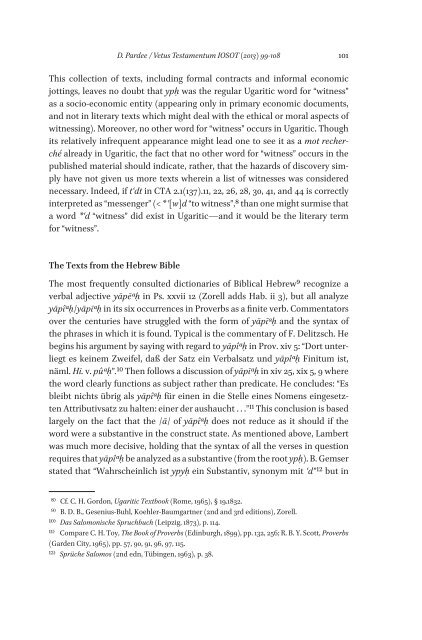Special Issue IOSOT 2013 - Books and Journals
Special Issue IOSOT 2013 - Books and Journals
Special Issue IOSOT 2013 - Books and Journals
You also want an ePaper? Increase the reach of your titles
YUMPU automatically turns print PDFs into web optimized ePapers that Google loves.
D. Pardee / Vetus Testamentum <strong>IOSOT</strong> (<strong>2013</strong>) 99-108 101<br />
This collection of texts, including formal contracts <strong>and</strong> informal economic<br />
jottings, leaves no doubt that ypḥ was the regular Ugaritic word for “witness”<br />
as a socio-economic entity (appearing only in primary economic documents,<br />
<strong>and</strong> not in literary texts which might deal with the ethical or moral aspects of<br />
witnessing). Moreover, no other word for “witness” occurs in Ugaritic. Though<br />
its relatively infrequent appearance might lead one to see it as a mot recherché<br />
already in Ugaritic, the fact that no other word for “witness” occurs in the<br />
published material should indicate, rather, that the hazards of discovery simply<br />
have not given us more texts wherein a list of witnesses was considered<br />
necessary. Indeed, if tʿdt in CTA 2.1(137).11, 22, 26, 28, 30, 41, <strong>and</strong> 44 is correctly<br />
interpreted as “messenger” (< *ʿ[w]d “to witness”,8 than one might surmise that<br />
a word *ʿd “witness” did exist in Ugaritic—<strong>and</strong> it would be the literary term<br />
for “witness”.<br />
The Texts from the Hebrew Bible<br />
The most frequently consulted dictionaries of Biblical Hebrew9 recognize a<br />
verbal adjective yāpēaḥ in Ps. xxvii 12 (Zorell adds Hab. ii 3), but all analyze<br />
yāpîaḥ/yāpīaḥ in its six occurrences in Proverbs as a finite verb. Commentators<br />
over the centuries have struggled with the form of yāpīaḥ <strong>and</strong> the syntax of<br />
the phrases in which it is found. Typical is the commentary of F. Delitzsch. He<br />
begins his argument by saying with regard to yāpîaḥ in Prov. xiv 5: “Dort unterliegt<br />
es keinem Zweifel, daß der Satz ein Verbalsatz und yāpîaḥ Finitum ist,<br />
näml. Hi. v. pûaḥ”.10 Then follows a discussion of yāpīaḥ in xiv 25, xix 5, 9 where<br />
the word clearly functions as subject rather than predicate. He concludes: “Es<br />
bleibt nichts übrig als yāpîaḥ für einen in die Stelle eines Nomens eingesetzten<br />
Attributivsatz zu halten: einer der aushaucht . . .”11 This conclusion is based<br />
largely on the fact that the /ā/ of yāpîaḥ does not reduce as it should if the<br />
word were a substantive in the construct state. As mentioned above, Lambert<br />
was much more decisive, holding that the syntax of all the verses in question<br />
requires that yāpîaḥ be analyzed as a substantive (from the root ypḥ). B. Gemser<br />
stated that “Wahrscheinlich ist ypyḥ ein Substantiv, synonym mit ʿd ”12 but in<br />
8) Cf. C. H. Gordon, Ugaritic Textbook (Rome, 1965), § 19.1832.<br />
9) B. D. B., Gesenius-Buhl, Koehler-Baumgartner (2nd <strong>and</strong> 3rd editions), Zorell.<br />
10) Das Salomonische Spruchbuch (Leipzig, 1873), p. 114.<br />
11) Compare C. H. Toy, The Book of Proverbs (Edinburgh, 1899), pp. 132, 256; R. B. Y. Scott, Proverbs<br />
(Garden City, 1965), pp. 57, 90, 91, 96, 97, 115.<br />
12) Sprüche Salomos (2nd edn, Tübingen, 1963), p. 38.








![Am HaSefer [Volk des Buches] - Books and Journals](https://img.yumpu.com/20648352/1/174x260/am-hasefer-volk-des-buches-books-and-journals.jpg?quality=85)







